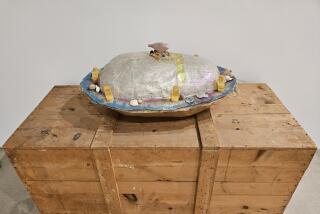Claims Conflict : Take Hughes Off Creditors Group, Smith Asks Court
- Share via
Smith International Monday filed a court action to have its business archrival, Hughes Tool Co., removed from the watchdog committee of creditors that is to monitor Smith’s bankruptcy proceedings.
The court action came as Smith announced it suffered a $265.1-million loss for 1985, due primarily to its defeat by Hughes in a 14-year patent infringement lawsuit.
“Hughes, as Smith’s principal competitor, has a direct and unavoidable financial interest in weakening Smith or perhaps even destroying it and has little or no incentive to rehabilitate Smith,” Smith wrote in a 16-page brief submitted to the U.S. Bankruptcy Court in Los Angeles.
Hughes attorney David Toy said Monday afternoon that he didn’t yet know of Smith’s motion, but he expects that Hughes will fight to remain on the committee of creditors that was formally appointed April 7 by the office of the U.S. trustee in Los Angeles.
Toy said that Hughes, which has been awarded a $204.8-million court judgment for patent infringement from Smith and thus is by far Smith’s largest creditor, has a right to be on the committee, which according to law may keep tabs on the financial condition of the debtor. “We don’t want them (Smith) acting unfrugally,” Toy said.
Smith’s massive loss includes an unusual charge of $216.9 million to cover the $204.8-million award to Hughes Tool Co. and other expenses related to the lengthy court battle.
Loss for Hughes
In 1984, Hughes suffered a net loss of $68.5 million. Revenues for last year were $697.3 million, down 6.6% from $746.6 million the previous year.
In the fourth quarter, Smith lost $206.8 million, contrasted with a loss of $75.9 million a year earlier. The fourth-quarter results included an unusual charge of $189.1 million that related to the Hughes patent award. Fourth-quarter revenues were $172.4 million, down from $201.5 million in the final quarter of 1984.
Toy said that as a member of the creditors’ committee, Hughes acknowledges it might come across competitive information. But he said Hughes proposed a solution to such possible conflict of interest in a March 26 letter to the U.S. trustee.
That letter said “Hughes recognizes that, as a competitor of Smith, it may be appropriate to exclude Hughes from time to time from certain reports to the committee from Smith.”
‘Chilling Effect’
However, Smith contends that Hughes’ proposed solution is not sufficient.
“Most importantly,” Smith said in its brief, “Hughes’ presence on the creditors committee will have a chilling effect on the relationship between the committee and Smith which will adversely affect the conduct of the reorganization proceeding.”
Smith said in its request to have Hughes withdrawn from the creditors committee that “Hughes stands to gain more in the long run by capturing Smith’s market share in the multi-billion-dollar oil service industry than by maximizing collection of its $204.8-million judgment.”
Peter Pearl, an attorney in the U.S. trustee office, said, “There is no set rule on whether a competitor can or cannot serve” on a creditors committee. “We take it case by case,” he said.
In Smith’s case, Pearl said, the trustee’s office put on the committee virtually all large creditors that requested to be appointed. Included, he said, are nine of Smith’s major trade creditors, representatives of nine banking institutions and Hughes.
Hughes was appointed to the committee, Pearl said, because it was a major unsecured creditor and the only one with a court judgment against Smith.
Pearl said the trustee’s office did not consider the competitive issue at all in selecting Hughes as a committee member. “We sort of figured it would come down to a judicial determination anyhow if Smith had a problem with Hughes serving,” he said.
Smith attorney J. Ronald Trost said Smith had informally indicated to the U.S. trustee’s office its dismay about Hughes’ appointment but had been told the issue was one for the courts to decide.
Hearing Scheduled
Trost said a hearing on the matter is scheduled for 3 p.m. in the court of U.S. Bankruptcy Judge James R. Dooley, who is presiding over Smith’s Chapter 11 bankruptcy proceeding.
In other action Monday, Dooley approved Smith’s request to appeal the patent verdict to the U.S. Circuit Court of Appeals in Washington, which hears all patent appeals.
Smith estimated that “if there are no delays” the patent appeal will be concluded in the appeals court in about a year, after which either Hughes or Smith could ask the U.S. Supreme Court to overrule the appellate decision.
Only after the patent dispute with Hughes is resolved, Smith said in court papers, will it propose a reorganization plan “to deal with its remaining $225 million of obligations, almost all of which is unsecured, to its banks, bondholders and trade creditors.”
More to Read
Inside the business of entertainment
The Wide Shot brings you news, analysis and insights on everything from streaming wars to production — and what it all means for the future.
You may occasionally receive promotional content from the Los Angeles Times.








